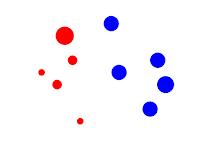My paper with Gregory Scontras and Noah Goodman on how people compare pluralities of objects along a given dimension was just accepted for publication in Cognition. The pre-print version can be downloaded here. Here's one of our stimuli. Do you think the red dots are bigger than the blue dots? Feedback on the paper is of course very much appreciated. Abstract: What does it mean to compare sets of objects along a scale, for example by saying “the men are taller than the women”? We explore comparison of pluralities in two experiments, eliciting comparison judgments while varying the properties of the members of each set. We find that a plurality is judged as “bigger” when the mean size of its members is larger than the mean size of the competing plurality. These results are incompatible with previous accounts, in which plural comparison is inferred from many instances of singular comparison between the members of the sets (Matushansky and Ruys, 2006). Our results suggest the need for a type of predication that ascribes properties to plural entities, not just individuals, based on aggregate statistics of their members. More generally, these results support the idea that sets and their properties are actively represented as single units.

No comments:
Post a Comment